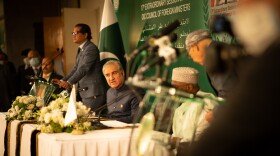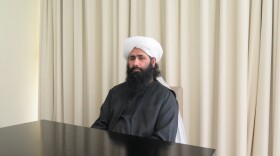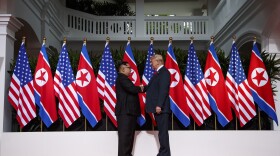
Hannah Bloch
Hannah Bloch is lead digital editor on NPR's international desk, overseeing the work of NPR correspondents and freelance journalists around the world.
Her first contributions to NPR were on the other side of the microphone when, as a writer and editor at National Geographic, she was interviewed by NPR for her reporting from Afghanistan and on the role failure plays in exploration. During her 2004-2014 tenure at National Geographic, she also reported from Easter Island and covered a range of topics including archaeology and global health.
From 2014-2017, Bloch wrote the "Work in Progress" column at The Wall Street Journal, highlighting efforts by social entrepreneurs and problem-solvers to make a measurable difference in the world.
Earlier in her career, she was Time Magazine's first full-time correspondent in Pakistan and Afghanistan, covering the rise and fall of the Taliban regime, Pakistan's nuclear tests, and the regrouping of al-Qaida after Sept. 11. She also established and led CNN's first bureau in Islamabad.
Bloch was part of NPR's Peabody Award-winning team covering the Ebola outbreak in 2014 and was the recipient of a John S. Knight Professional Journalism Fellowship at Stanford University and a Freedom Forum Asia Studies Fellowship at the University of Hawaii.
She is a graduate of the University of Pennsylvania and earned master's degrees in journalism and international affairs from Columbia University.
-
NPR Staff recommends several non-fiction titles from Books We Love: "Good Movies As Old Books," "Pakistan," "Baldwin: A Love Story," and "One Day Everyone Will Have Always Been Against This."
-
Millions of people in Afghanistan are facing hunger and starvation amid a prolonged drought and economic crash. A World Food Program spokesperson says a new urban class of hungry people has emerged.
-
The emergency gathering of the Organization for Islamic Cooperation was the largest international meeting on Afghanistan since the country fell to the Taliban in August.
-
This week, members of the Afghanistan National Institute of Music flew from Doha to Portugal, where they'll rebuild their school — and lives. They describe their escape from Kabul and future hopes.
-
"We want to prove to everyone forever that we respect humanity," Taliban spokesman Muhammad Naeem Wardak told NPR in Doha, Qatar. He also said women "must have the right to education and to work."
-
In a year overshadowed by COVID-19, the world saw plenty of other significant developments. Here are some glimpses of the protests, conflicts — and efforts at peace — that helped define 2020.
-
A turbulent decade began with the Arab Spring and ended with a swell of anti-government demonstrations from Latin America to India, Sudan and Hong Kong. Here's a glimpse of protests outside the U.S.
-
Some of the most-read stories by NPR's international reporters looked at endangered rhinos, livid Canadians, Mexico's response to migrants and a show-stealing eye roll at a Chinese political event.
-
With the ban lifted on female drivers, Saudi women can sit legally in the driver's seat for the first time. But global concern is high over detention of activists who fought for the right to drive.
-
Tuesday's meeting between President Trump and Kim Jong Un marks the start of a long negotiation process over North Korea's nuclear weapons program. Here are highlights in photos from a momentous day.





